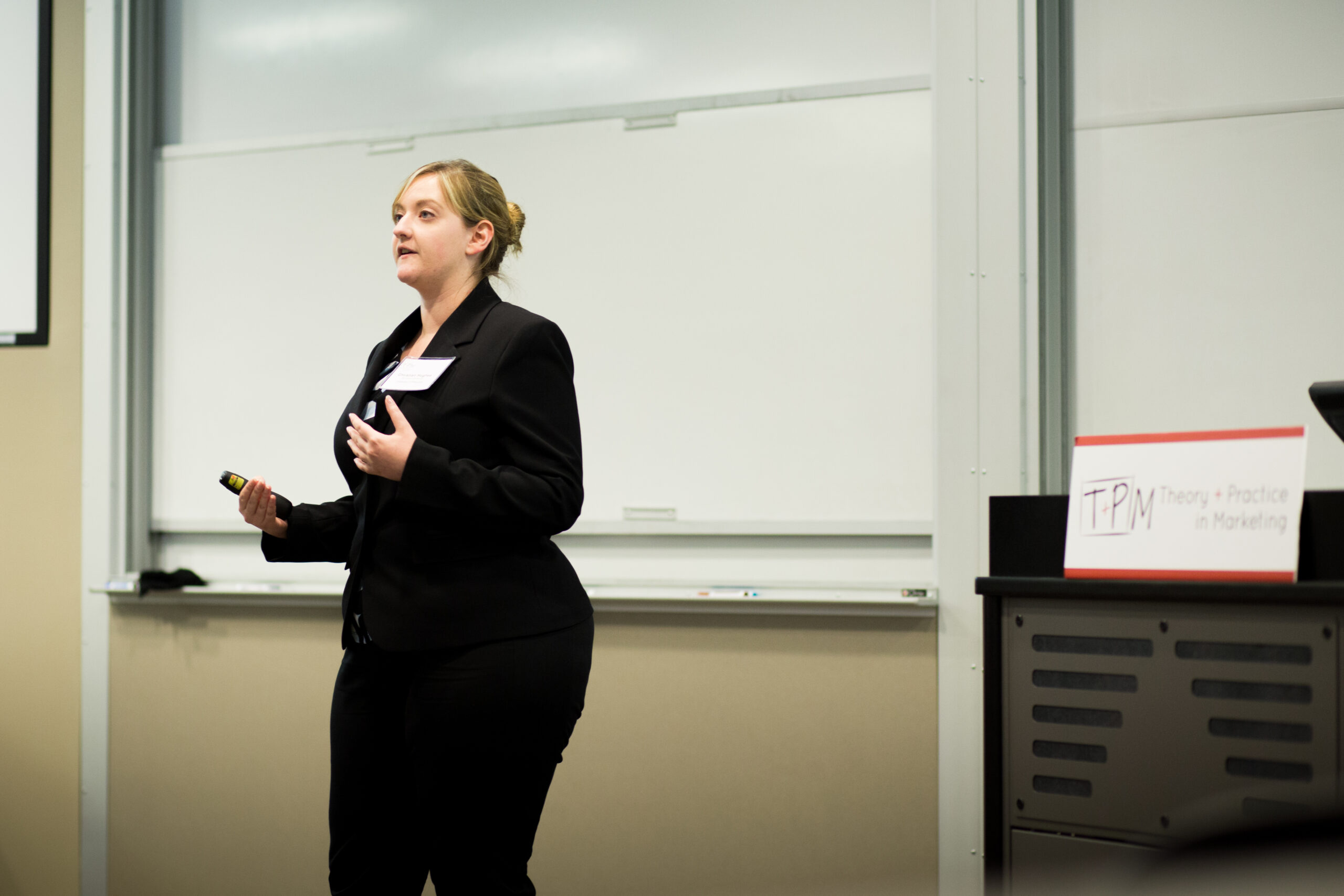Mays joins Harvard, Columbia in hosting 6th annual Theory + Practice in Marketing Conference
May 26, 2016
|
Mays Business School
 During the three-day event, 45 research papers were presented in rapid succession. Following only 20 minutes of content overview, scholars received feedback about their topic’s relevancy and potential for application in a business setting from academic peers and industry executives.
During the three-day event, 45 research papers were presented in rapid succession. Following only 20 minutes of content overview, scholars received feedback about their topic’s relevancy and potential for application in a business setting from academic peers and industry executives.
Additionally, the conference’s initial title included the word “method.” But by replacing it with “practice,” the founders hoped to shift traditional academic focus on methodology instead to explore how scholarly research can improve business efficiencies, understanding of consumer behavior, and much more. TPM uniquely positions the implications of research, not the analytic process or data set, as the hero of the story.
1. What problem are you trying to solve?
2. Why should anyone care?
3. What do you have to say that no one else has said before?
First-year Mays Ph.D. candidate Unnati Narang presented, “Do Mobile Apps Influence Shopper Behavior? Evidence from Omnichannel Retailing,” built on the Center for Retailing Studies’ research partnership with GameStop. Each of the papers submitted were split into groups based on content and themes including: marketing leadership and relevance; brand management; display advertising; mobile, shopping, and gaming; social effects and online communities; digital marketing; among others.
“The 2016 TPM conference was a huge success, raising Mays Business School’s visibility and enhancing the marketing group’s reputation,” said Shankar, who was co-chair of the conference. “It also positively showcased our first class facilities in Houston’s CityCentre.”
Participants rated the research presentations as most stimulating and the industry speakers and discussants as most insightful. “Terrific” and “fantastic” were some of the adjectives used by participants’ feedback surveys.
Throughout the remainder of the conference, industry executives – dubbed “practitioners” in academic circles – participated as:
• Business discussants, providing critiques pulled from their professional experiences
• Panelists, highlighting the need to bridge academia and practice
• Keynotes, explaining the relevance of these topics and importance for large scale partnerships
The group included Craig Ceccanti, co-founder and CEO of Pinot’s Palette; Anita Seghal, senior vice president of marketing and communications for the Houston Astros; Mike Francis ’06, strategy director at Halliburton; and Bruce Pool, president and managing director of Aggreko Rental Solutions.
Many of these participants are connected to Mays as undergraduate, Executive MBA graduates or as frequent classroom guest speakers.
Also represented were Galen Walters, founder and CEO of Go Think! Retail; Michael Albrecht, CDO and senior vice president of Albrecht AdVisors (formerly CDO and senio vice president for Love Advertising); Girish Sardeshapande, principal at the Dialog Group; Pablo Azar, senior vice president of PNC Financial Services Group; Jessica Lawson ’08, marketing director for Ignite Restaurant Group; and Rajendra Srivastava, dean of the Indian Business School.
Tim Krause, principal at TDKrause Consulting (former chief marketing officer of Alcatel-Lucent, leading IP networking, ultra-broadband access, and cloud technology specialist), served as the dinner keynote on Thursday, emphasizing that “collaboration begins by creating a network of innovation.”
He also stressed the importance of building a team of individuals who are able to contribute different perspectives. They should examine different parts of the issue – what he calls an “outside in approach.” If you give marketers the tools to succeed, he said, businesses can get ahead.
Krause challenged the academic researchers and Ph.D. students to:
1. Focus on real problems.
2. Don’t get distracted with noise.
3. Break your network. The new networks you form ad hoc will be the one that is worth it in the long run.
4. Stop finding solutions to problems that don’t exist.
“Given the long-time reputation of Mays as one of the strongest departments in the world for substantive marketing strategy research, it was a real thrill for us to get to host TPM 2016 with its focus on rigor and relevance,” said Mark Houston, head of the Department of Marketing at Mays.
“Tim [Krause] did a great job by tasking conference participants to focus their research on solving problems that matter. Overall, TPM had a big impact on the attendees. Their presentations have me excited to see the quality of research papers that will be published as a result.”
The best of the papers presented at the 2016 Theory + Practice in Marketing conference will be published in the Journal of Marketing Research, a premier marketing journal.
Also announced by TPM co-founder, Bernd Schmitt (Columbia School of Business), was the international expansion of the conference. TPM Asia is planned for June 2016 in Seoul, Korea.
For more information about the Theory + Practice in Marketing conference, visit theorypractice.org.


